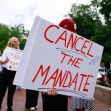On Saturday, two students at Loyola Marymount, a private Catholic university located in Los Angeles, California, sued the institution over new COVID-19 policies.
Loyola Marymount is one of over 400 universities to implement a COVID-19 vaccine mandate for students. In preparation for the return of in-person classes this fall, the university will require staff and students to show proof of vaccination. According to their website, all students must be fully vaccinated by August 9th. For students who plan to live on campus, failure to comply may result in the cancelation of their housing agreement.
Despite the university’s policy, the school will make exceptions for medical or religious reasons. Students are required to fill out a vaccination exemption form available online. Medical exemptions require the signature of a physician, nurse, or physician assistant. Religious exemptions require a description and explanation of the principle that objects to receiving the COVID vaccination. Religious exemptions only apply to the COVID vaccine and not other required immunizations.
The plaintiffs, Ryan Khanthaphixay and Riley O’Neal, have described the school’s policy as “apartheid,” arguing that different treatment for unvaccinated individuals is discriminatory and unconstitutional. The plaintiffs hold that the institution’s policy violates equal protection under the Fourteenth Amendment. Furthermore, they argue that religious beliefs and medical conditions prevent individuals from getting the vaccine, despite the school’s policy that the institution would make exceptions for these reasons on a case-by-case basis.
This lawsuit is one of many illustrating the challenge in implementing vaccine mandates. Last week, U.S. District Court Judge Damon Leichty upheld the legality of similar policies at Indiana University. In doing so, Judge Leighty notes, "this university policy is not forced vaccination. The students have options -- taking the vaccine, applying for a religious exemption, applying for a medical exemption, applying for a medical deferral, taking a semester off, or attending another university."
The United States has a rich legal history regarding vaccine mandates. In 1905, the Supreme Court upheld mandatory immunizations during the smallpox public health crisis in Jacobson vs. Massachusetts. Today, all 50 states have laws requiring certain immunizations for students attending public K-12 schools. Vaccine mandates are also typical in higher education settings. A majority of universities require the submission of immunization records prior to attending.
While required immunization for students is not a new practice, controversy persists. Last year, the University of California was sued after requiring that students receive the flu vaccine. Although the university system won the case, typically only vaccines that are fully approved by the FDA have been mandated. While the major pharmaceutical companies anxiously await the FDA’s decision for full approval, institutions of higher education are exposed to an influx of legal issues.






